Analysis of CSR Accounting and Social Responsibility at Westpac Bank
VerifiedAdded on 2020/03/23
|5
|781
|62
Report
AI Summary
This report analyzes the CSR accounting and social responsibility of Westpac Bank. It begins with a background of the bank, its vision, and the ethical issues it faces. The report then explores Westpac's approach to shareholder value and staff morale within a theoretical framework. It discusses the credibility of CSR reporting and the lack of mandatory regulations for smaller companies. The solution and recommendation section suggests outsourcing auditing for sustainability efforts, outlining the advantages, such as cost savings, focus on core business, and improved quality, as well as the disadvantages, such as increased risk. The report concludes with a bibliography of cited sources.
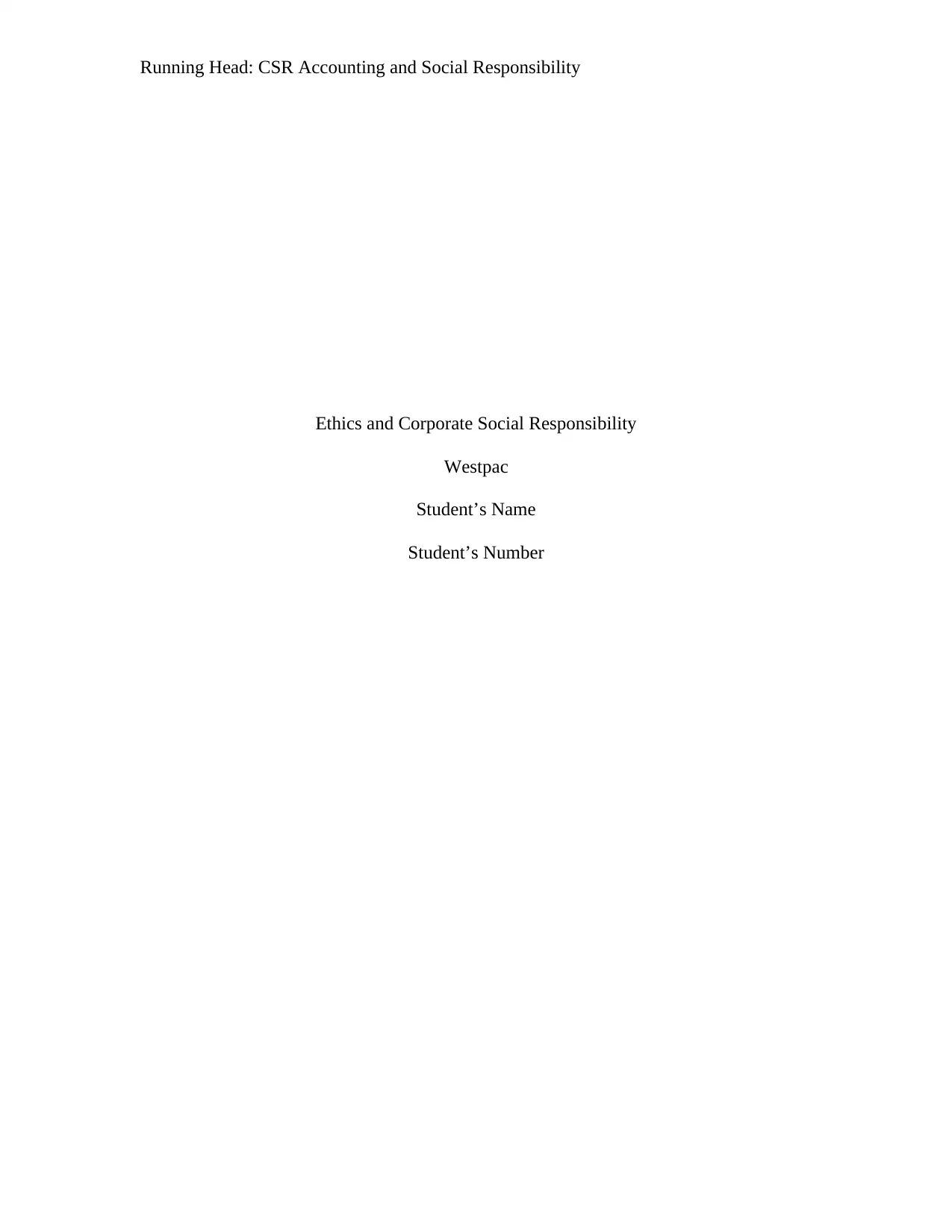
Running Head: CSR Accounting and Social Responsibility
Ethics and Corporate Social Responsibility
Westpac
Student’s Name
Student’s Number
Ethics and Corporate Social Responsibility
Westpac
Student’s Name
Student’s Number
Paraphrase This Document
Need a fresh take? Get an instant paraphrase of this document with our AI Paraphraser
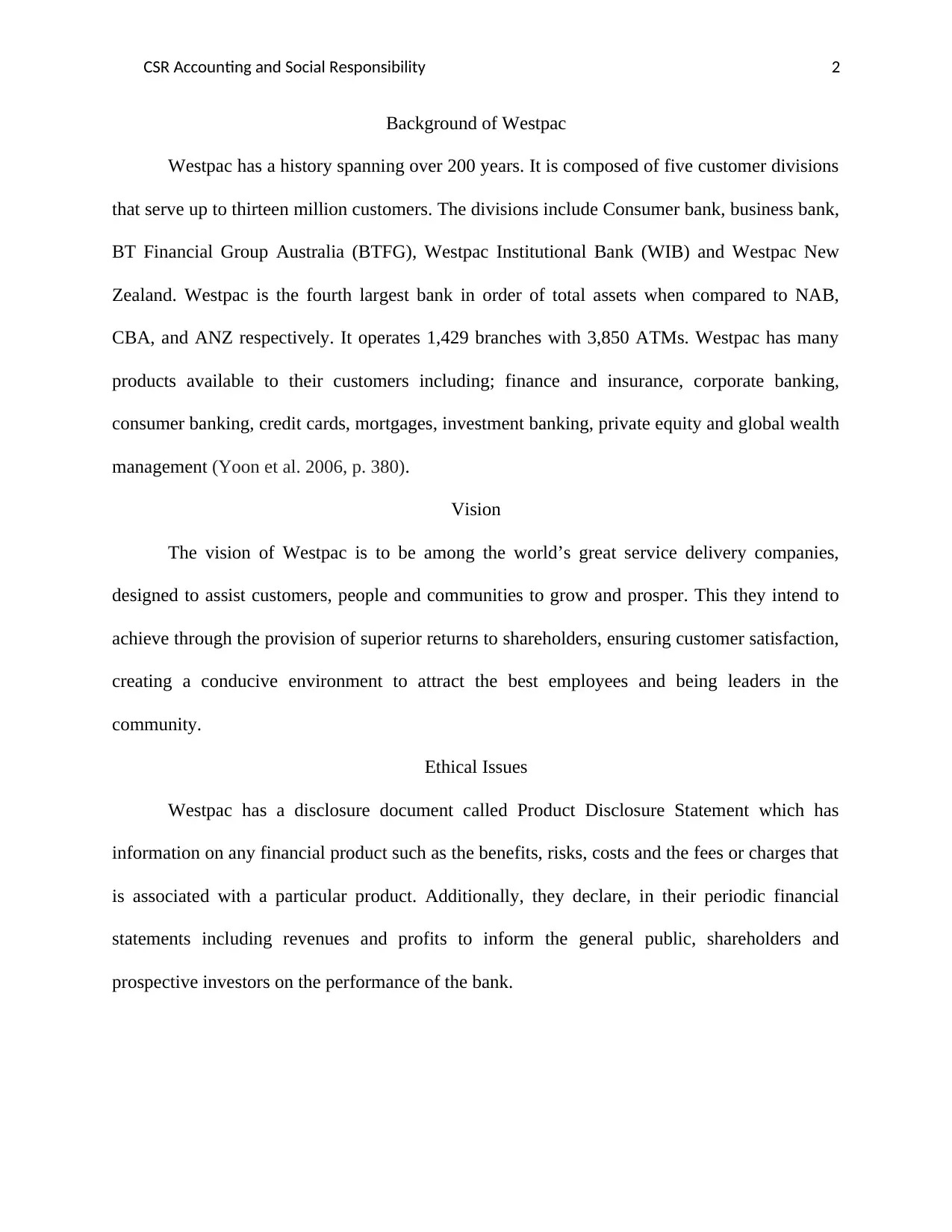
CSR Accounting and Social Responsibility 2
Background of Westpac
Westpac has a history spanning over 200 years. It is composed of five customer divisions
that serve up to thirteen million customers. The divisions include Consumer bank, business bank,
BT Financial Group Australia (BTFG), Westpac Institutional Bank (WIB) and Westpac New
Zealand. Westpac is the fourth largest bank in order of total assets when compared to NAB,
CBA, and ANZ respectively. It operates 1,429 branches with 3,850 ATMs. Westpac has many
products available to their customers including; finance and insurance, corporate banking,
consumer banking, credit cards, mortgages, investment banking, private equity and global wealth
management (Yoon et al. 2006, p. 380).
Vision
The vision of Westpac is to be among the world’s great service delivery companies,
designed to assist customers, people and communities to grow and prosper. This they intend to
achieve through the provision of superior returns to shareholders, ensuring customer satisfaction,
creating a conducive environment to attract the best employees and being leaders in the
community.
Ethical Issues
Westpac has a disclosure document called Product Disclosure Statement which has
information on any financial product such as the benefits, risks, costs and the fees or charges that
is associated with a particular product. Additionally, they declare, in their periodic financial
statements including revenues and profits to inform the general public, shareholders and
prospective investors on the performance of the bank.
Background of Westpac
Westpac has a history spanning over 200 years. It is composed of five customer divisions
that serve up to thirteen million customers. The divisions include Consumer bank, business bank,
BT Financial Group Australia (BTFG), Westpac Institutional Bank (WIB) and Westpac New
Zealand. Westpac is the fourth largest bank in order of total assets when compared to NAB,
CBA, and ANZ respectively. It operates 1,429 branches with 3,850 ATMs. Westpac has many
products available to their customers including; finance and insurance, corporate banking,
consumer banking, credit cards, mortgages, investment banking, private equity and global wealth
management (Yoon et al. 2006, p. 380).
Vision
The vision of Westpac is to be among the world’s great service delivery companies,
designed to assist customers, people and communities to grow and prosper. This they intend to
achieve through the provision of superior returns to shareholders, ensuring customer satisfaction,
creating a conducive environment to attract the best employees and being leaders in the
community.
Ethical Issues
Westpac has a disclosure document called Product Disclosure Statement which has
information on any financial product such as the benefits, risks, costs and the fees or charges that
is associated with a particular product. Additionally, they declare, in their periodic financial
statements including revenues and profits to inform the general public, shareholders and
prospective investors on the performance of the bank.
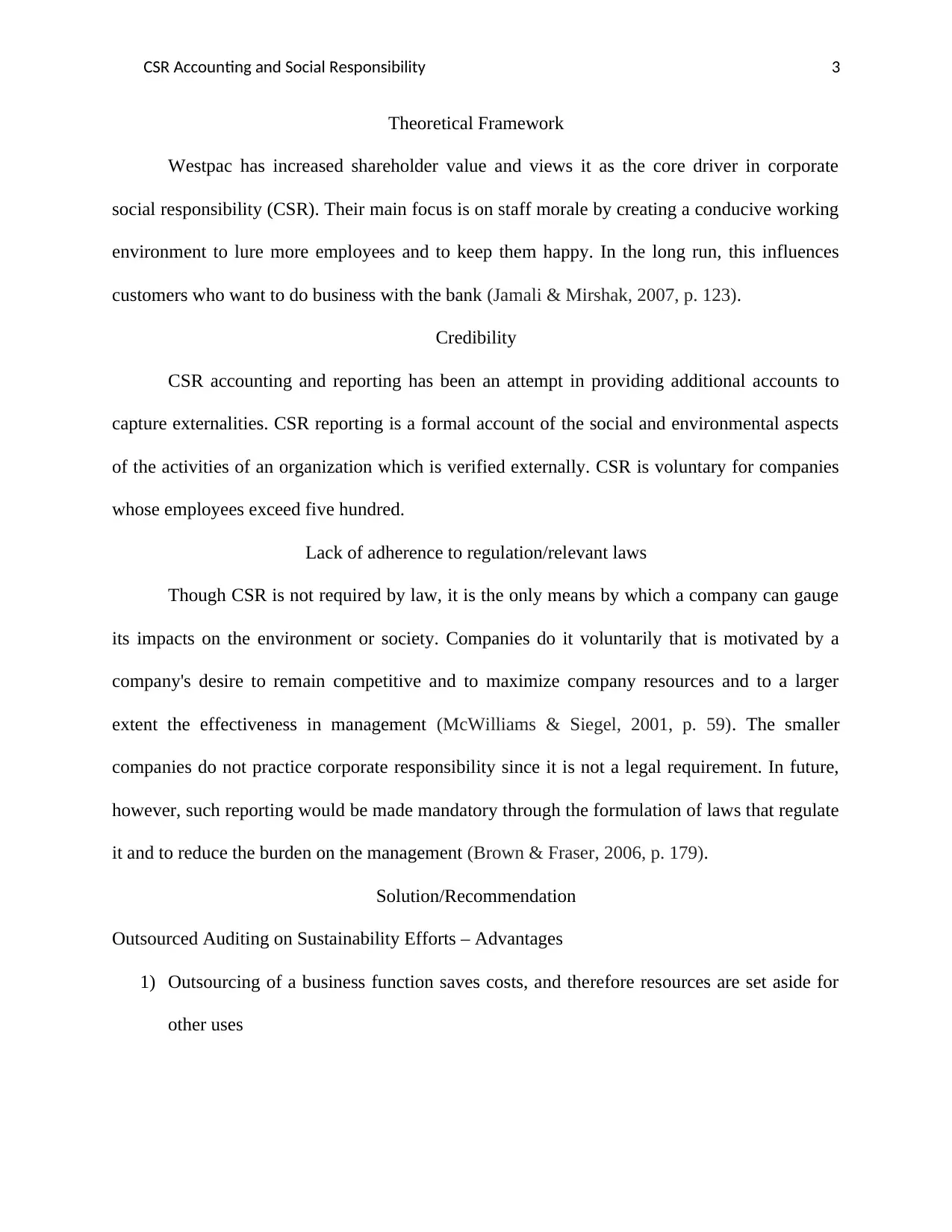
CSR Accounting and Social Responsibility 3
Theoretical Framework
Westpac has increased shareholder value and views it as the core driver in corporate
social responsibility (CSR). Their main focus is on staff morale by creating a conducive working
environment to lure more employees and to keep them happy. In the long run, this influences
customers who want to do business with the bank (Jamali & Mirshak, 2007, p. 123).
Credibility
CSR accounting and reporting has been an attempt in providing additional accounts to
capture externalities. CSR reporting is a formal account of the social and environmental aspects
of the activities of an organization which is verified externally. CSR is voluntary for companies
whose employees exceed five hundred.
Lack of adherence to regulation/relevant laws
Though CSR is not required by law, it is the only means by which a company can gauge
its impacts on the environment or society. Companies do it voluntarily that is motivated by a
company's desire to remain competitive and to maximize company resources and to a larger
extent the effectiveness in management (McWilliams & Siegel, 2001, p. 59). The smaller
companies do not practice corporate responsibility since it is not a legal requirement. In future,
however, such reporting would be made mandatory through the formulation of laws that regulate
it and to reduce the burden on the management (Brown & Fraser, 2006, p. 179).
Solution/Recommendation
Outsourced Auditing on Sustainability Efforts – Advantages
1) Outsourcing of a business function saves costs, and therefore resources are set aside for
other uses
Theoretical Framework
Westpac has increased shareholder value and views it as the core driver in corporate
social responsibility (CSR). Their main focus is on staff morale by creating a conducive working
environment to lure more employees and to keep them happy. In the long run, this influences
customers who want to do business with the bank (Jamali & Mirshak, 2007, p. 123).
Credibility
CSR accounting and reporting has been an attempt in providing additional accounts to
capture externalities. CSR reporting is a formal account of the social and environmental aspects
of the activities of an organization which is verified externally. CSR is voluntary for companies
whose employees exceed five hundred.
Lack of adherence to regulation/relevant laws
Though CSR is not required by law, it is the only means by which a company can gauge
its impacts on the environment or society. Companies do it voluntarily that is motivated by a
company's desire to remain competitive and to maximize company resources and to a larger
extent the effectiveness in management (McWilliams & Siegel, 2001, p. 59). The smaller
companies do not practice corporate responsibility since it is not a legal requirement. In future,
however, such reporting would be made mandatory through the formulation of laws that regulate
it and to reduce the burden on the management (Brown & Fraser, 2006, p. 179).
Solution/Recommendation
Outsourced Auditing on Sustainability Efforts – Advantages
1) Outsourcing of a business function saves costs, and therefore resources are set aside for
other uses
⊘ This is a preview!⊘
Do you want full access?
Subscribe today to unlock all pages.

Trusted by 1+ million students worldwide
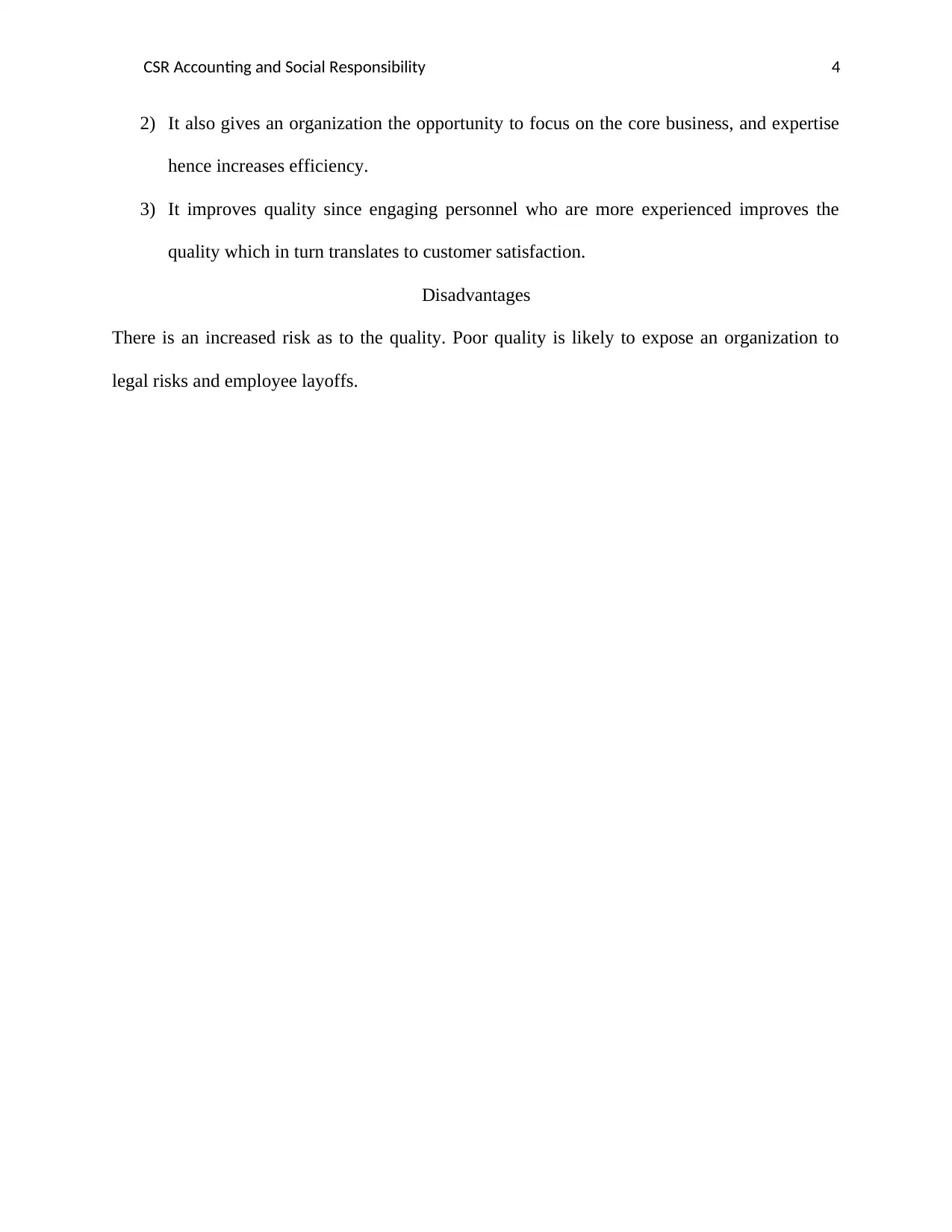
CSR Accounting and Social Responsibility 4
2) It also gives an organization the opportunity to focus on the core business, and expertise
hence increases efficiency.
3) It improves quality since engaging personnel who are more experienced improves the
quality which in turn translates to customer satisfaction.
Disadvantages
There is an increased risk as to the quality. Poor quality is likely to expose an organization to
legal risks and employee layoffs.
2) It also gives an organization the opportunity to focus on the core business, and expertise
hence increases efficiency.
3) It improves quality since engaging personnel who are more experienced improves the
quality which in turn translates to customer satisfaction.
Disadvantages
There is an increased risk as to the quality. Poor quality is likely to expose an organization to
legal risks and employee layoffs.
Paraphrase This Document
Need a fresh take? Get an instant paraphrase of this document with our AI Paraphraser
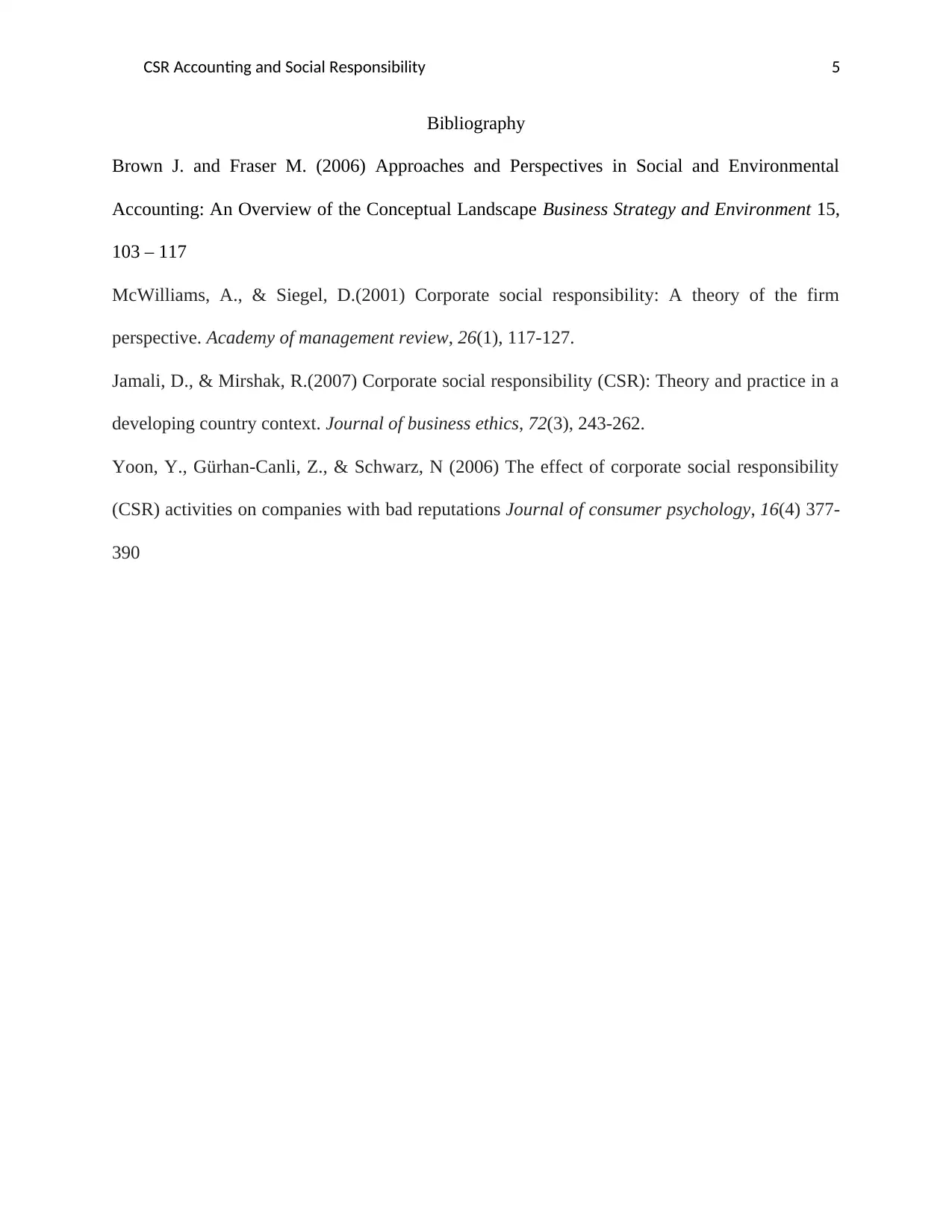
CSR Accounting and Social Responsibility 5
Bibliography
Brown J. and Fraser M. (2006) Approaches and Perspectives in Social and Environmental
Accounting: An Overview of the Conceptual Landscape Business Strategy and Environment 15,
103 – 117
McWilliams, A., & Siegel, D.(2001) Corporate social responsibility: A theory of the firm
perspective. Academy of management review, 26(1), 117-127.
Jamali, D., & Mirshak, R.(2007) Corporate social responsibility (CSR): Theory and practice in a
developing country context. Journal of business ethics, 72(3), 243-262.
Yoon, Y., Gürhan-Canli, Z., & Schwarz, N (2006) The effect of corporate social responsibility
(CSR) activities on companies with bad reputations Journal of consumer psychology, 16(4) 377-
390
Bibliography
Brown J. and Fraser M. (2006) Approaches and Perspectives in Social and Environmental
Accounting: An Overview of the Conceptual Landscape Business Strategy and Environment 15,
103 – 117
McWilliams, A., & Siegel, D.(2001) Corporate social responsibility: A theory of the firm
perspective. Academy of management review, 26(1), 117-127.
Jamali, D., & Mirshak, R.(2007) Corporate social responsibility (CSR): Theory and practice in a
developing country context. Journal of business ethics, 72(3), 243-262.
Yoon, Y., Gürhan-Canli, Z., & Schwarz, N (2006) The effect of corporate social responsibility
(CSR) activities on companies with bad reputations Journal of consumer psychology, 16(4) 377-
390
1 out of 5
Related Documents
Your All-in-One AI-Powered Toolkit for Academic Success.
+13062052269
info@desklib.com
Available 24*7 on WhatsApp / Email
![[object Object]](/_next/static/media/star-bottom.7253800d.svg)
Unlock your academic potential
Copyright © 2020–2026 A2Z Services. All Rights Reserved. Developed and managed by ZUCOL.





